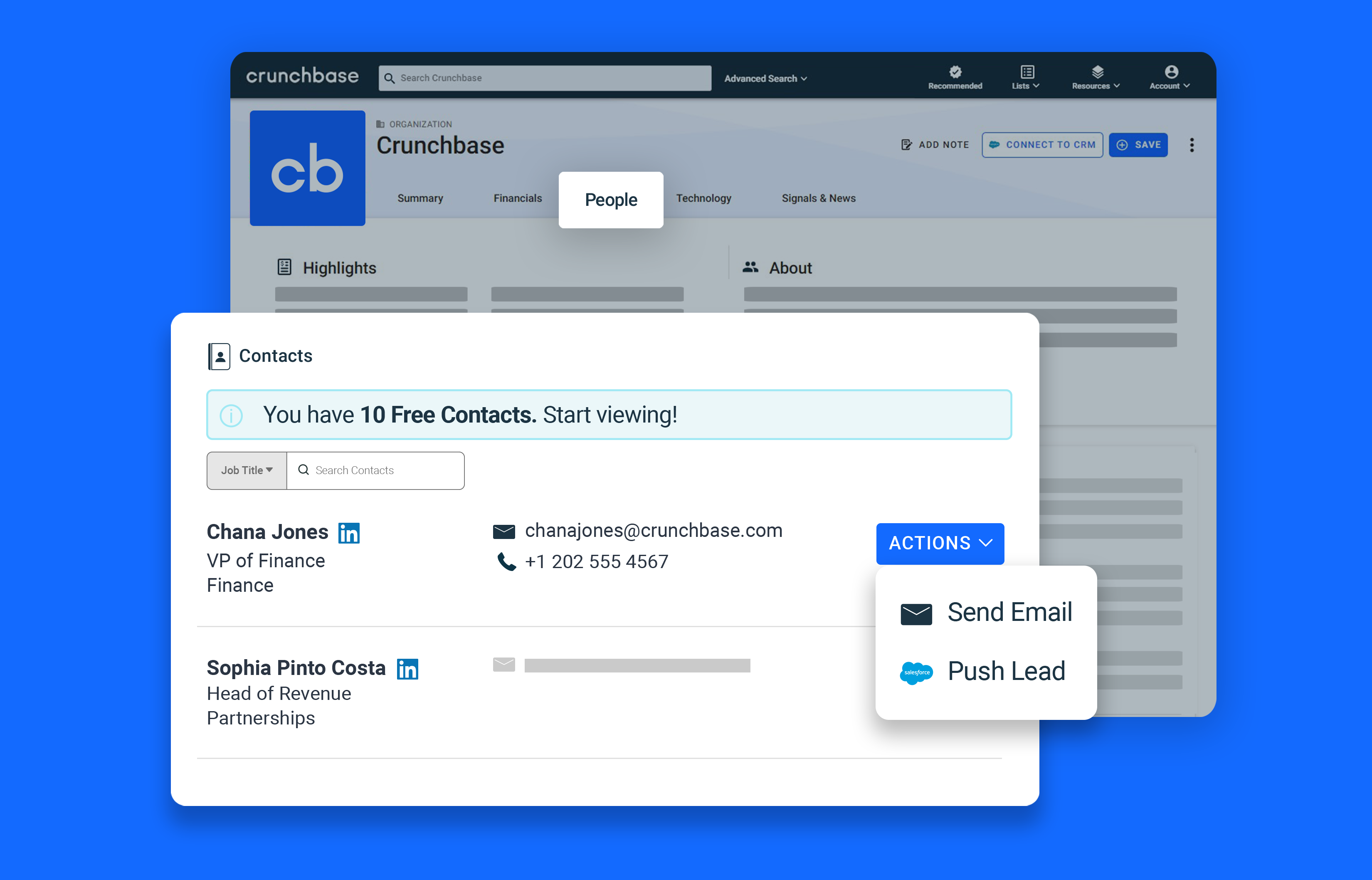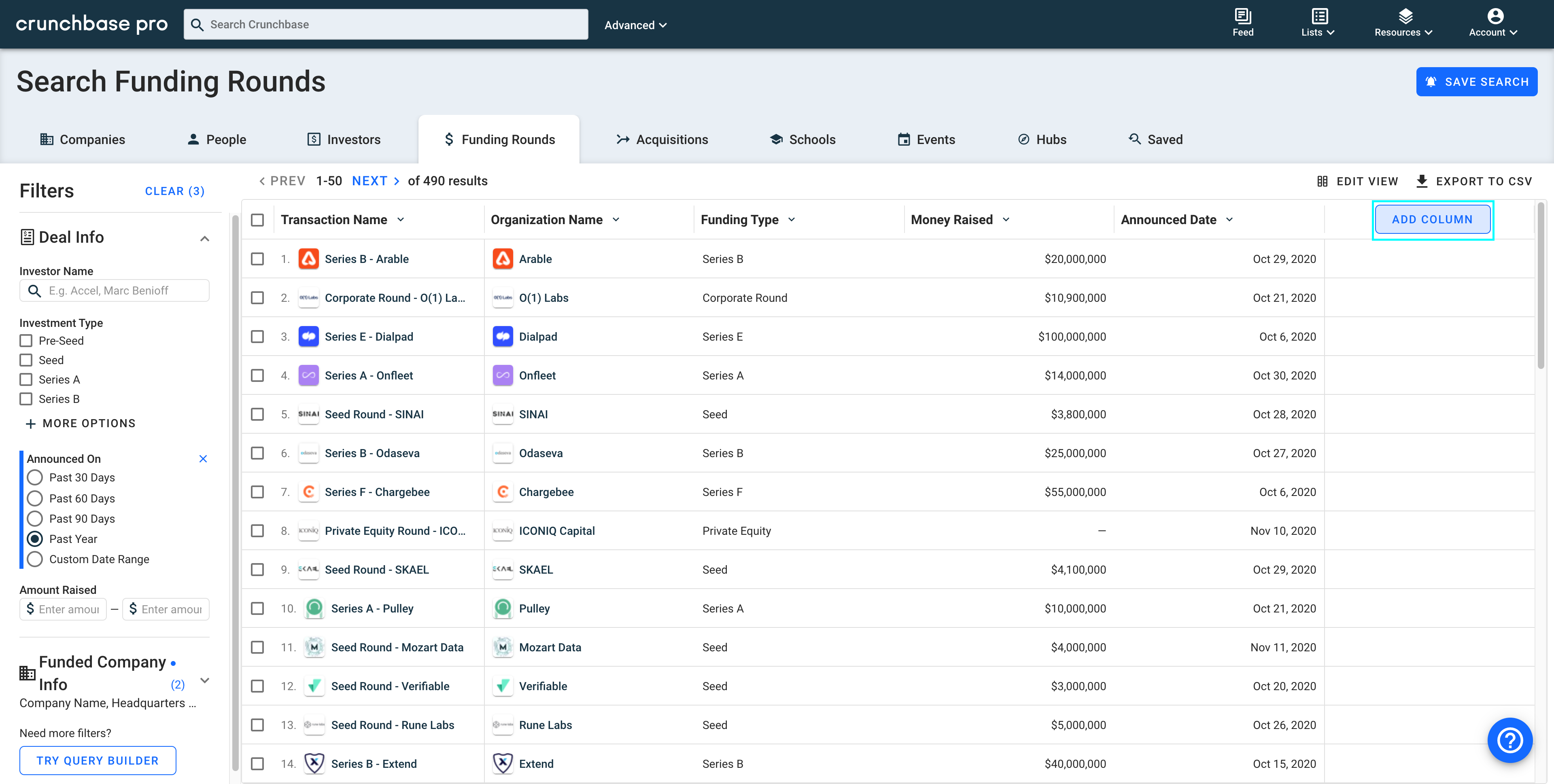In both down times and boom times, businesses across industries are faced with the challenge of building sales pipelines and closing revenue. “Account-based” intelligence — i.e., research into potential customers — can help during the prospecting process. But it requires a thorough, vetted source of information and contacts in departments like business development, sales and recruiting.
That’s why a growing number of businesses rely on Crunchbase, asserts CEO Jager McConnell. With roots in a homegrown project by TechCrunch founder Michael Arrington designed to index startups featured in TechCrunch articles, Crunchbase has evolved over the past 15 years into an API-driven database of startups and financial reports, along with a growing news division.
Crunchbase now attracts over 75 million unique visitors annually and recently surpassed 60,000 paying customers, with over half of the Fortune 500 represented, according to McConnell.
“We enable prospectors to find and engage with qualified accounts, while simultaneously creating awareness for companies that want to be discovered,” he told TechCrunch via email. “From the day of our spinout [as an independent company in 2015] … we’ve built a prospecting platform powered by the best-in-class proprietary data we’re known for, allowing deal-makers to find and engage with qualified accounts while simultaneously creating awareness for companies that want to be discovered.”
Investors seem convinced. This morning, Crunchbase closed an oversubscribed $50 million series D round led by Alignment Growth with participation from OMERS Ventures, Mayfield and Emergence Capital. CEO Jager McConnell declined to reveal the valuation but described it as a “significant up round.” Crunchbase had a post-money valuation of $150 million as of the closing of its Series C .

Image Credits: Crunchbase
“The Crunchbase software-as-a service platform combines rich and proprietary company data with direct access to decision-makers within a single intuitive interface — at compelling price points, making it a powerful tool for driving return on investment across a variety of use cases, from sales to recruiting and more,” Alignment growth partner Alex Iosilevich said in an emailed statement. Iosilevich plans to soon join the Crunchbase board of directors. “We expect that Crunchbase will continue to gain accelerated industry adoption and are excited to support the company’s growth momentum alongside strong participation from the existing investor group.”
The core of Crunchbase as it exists today is a research suite for sales teams. Entries show when a company was founded, its founders and executive leadership, and financing and debt rounds (and their contributors). Paid Crunchbase plans unlock data about competitors, history and more.
Crunchbase employs a team of writers covering funding rounds and other Crunchbase-relevant content over at Crunchbase News. (This writer has been known to cite their work from time to time.) As for the primary database, it’s updated manually and automatically by way of thousands of partnerships and syndication deals with LinkedIn, Business Insider and others.
The way McConnell sees it, Crunchbase can reduce the amount of time sales teams spend prospecting by highlighting companies with “growth signals” — for example, funding rounds or increased product adoption.
“As difficult economic conditions impact more companies, knowing whether a target account is on the upswing or not gives prospectors the power to focus outreach on decision-makers with buying power,” McConnell said. “Our tools encourage account-based selling, which encourages deal-makers to prioritize their prospecting efforts based on the companies they should be contacting rather than the individuals. This is the opposite approach to ‘spray and pray,’ which relies on massive contact lists and leads to the kind of spammy outreach that no one likes.”
Additions to the platform within the past few months focus on discovery, for example allowing Crunchbase customers to find companies that meet a profile by filtering for territories or characteristics like “diversity.” Machine learning-powered recommendations show new accounts and similar companies to consider, while customer relationship management data in search spotlights accounts that might be new to a given salesperson.
Beyond discovery, McConnell drew attention to Crunchbase’s recent qualification and tracking improvements, like a Chrome extension that shows context on accounts as they’re being researched. Crunchbase customers can now sync new accounts that meet their criteria to Salesforce and get email alerts on “priority” accounts, or created lists, saved searches, notes and tags for matches.

Image Credits: Crunchbase
On the engagement tooling side, Crunchbase now shows “decision-maker” contact data — which is searchable — and integrates with email providers including Gmail. Customers can use auto-generated email templates that pull in relevant, targeted data about prospects of particular interest.
McConnell says that Crunchbase resisted adding contact data for “a long time” due to privacy concerns but ultimately came to the conclusion that it was “incredibly valuable” for customers. “We’ve gone out of our way to make sure we’re doing this the right way, encouraging informed outreach and complying with all laws and regulations as they currently stand,” he said. “Thankfully, our business model does not at all depend on contact data.”
Crunchbase competes not only with PitchBook but with CB Insights, Owler and other prospecting services and databases. Lusha, a crowdsourced data platform for business-to-business sales, recently raised $205 million at a $1.5 billion valuation. Meanwhile, Apollo.io landed $110 million as its sales intelligence platform crossed 16,000 paying companies.
McConnell sees differentiation — and raw ambition — as the key to Crunchbase’s continued growth. To this end, Crunchbase plans to launch an integration with Hubspot and enhanced machine learning-powered suggestions that recommend accounts, contacts and tasks toward various prospecting goals. Also in development are more sophisticated dashboards to help customers track “efficacy of activities” on Crunchbase, including annual recurring revenue (ARR) generated by opportunities discovered through the platform.
“The recent onslaught of down rounds and mass layoffs from companies who very recently hit unicorn status shows how outsized burn rates can be hidden behind oversized funding rounds, covering up the reality of weak business fundamentals,” McConnell said. “I’m especially proud of the fact that we have been able to generate growth while keeping our burn rate in check. In the first half of this year, we drove $9 million net new ARR at only $2 million burn — that’s best in class according to Bessemer’s efficiency benchmarks,and puts us on the path to profitability … We plan to double our business-to-business software ARR this year, ending around $38 million in ARR just for this customer segment.”
Crunchbase’s latest funding brings its total raised to $106.5 million. A portion of the proceeds will be put toward expanding the 220-person team to around 275 by the end of the year, according to McConnell.
